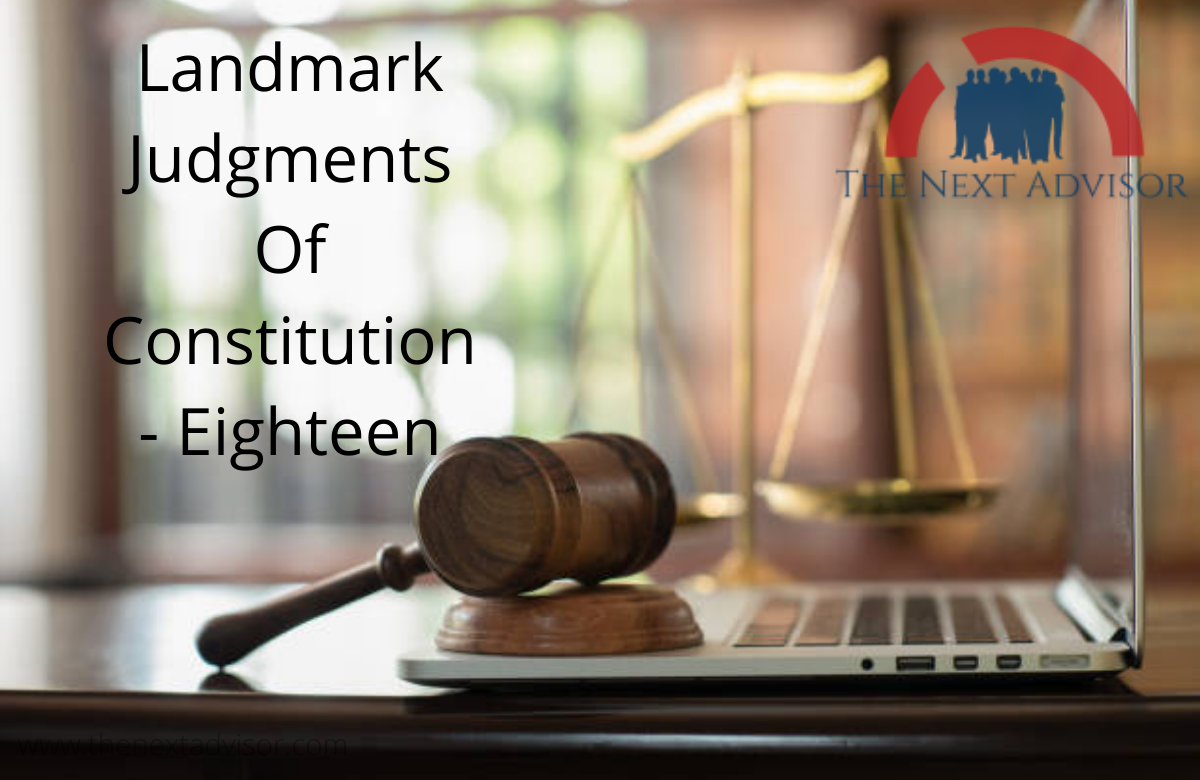Landmark Judgments Of Constitution – Eighteen, which Means you can read here Eighteen Landmark Judgments of Constitution. Which will help you for very different important purposes.
-
S. R. Bommai v Union of India 1994 In this federalism is the basic structure of the constitution, in this case, it was also determined that secularism is the basic structure of the constitution.
-
Kesavananda Bharati vs State of Kerala Preamble is part of the constitution and deals with its basic structure.
-
(Visheshwarnath Vs Income Tax Commissioner) Viadhale Shilesha No citizen can waive his fundamental right. (Visheshwarnath Vs Income Tax Commissioner) No citizen can waive his fundamental right.
-
M Nagaraj Vs Union of India, 2007 Fundamental Rights There is no donation by the state to the citizens. Part-3 does not provide Fundamental Rights but confirms that they exist and they should be protected.
-
Mandeep Mishra Vs Union of India, 2009 Calcutta 31 Public Charitable Trust Vol. 12 does not come under the category of the state, so no writ can be brought against them.
-
In L Chandrakumar vs Union of India, Supreme Court and High Court in this case The power of judicial review conferred under 32 and 226 is part of the basic structure of the Constitution and is given under Articles. The constitution under 368 cannot be abolished even by amendment.
-
State of West Bengal Vs. West Bengal Protection of Democratic Rights Committee AIR 2010 SC, held that judicial review is the basic structure of the Constitution and cannot be abolished by an Act passed by Parliament.
-
In Dulare Lodh v. Third Additional Judge, Kanpur, the principle of cover applies to post-constitutional laws even if they pertain to citizens.
-
In this case, Dhirendra Chamoli v State of Uttar Pradesh, the principle of equal pay for equal work is also applicable to casually employed daily wage workers.
-
The economic policies of the Valco Employees Union (Registered) Vs Union of India cannot be judicially reviewed unless there is an express violation of the Constitution or any Act.
-
Mithu v. the State of Punjab The Supreme Court declared Section 303 of the Indian Penal Code to be illegal for being in contravention of Article 14.
-
Javed v. the State of Haryana, 2003 SC 2902 The provision made by the State of Haryana in the Panchayat State Act to disqualify persons having more than two children for holding the office of Sarpanch or Up-Sarpanch is valid and constitutional.
-
Dhirendra Pandua v. the State of Orissa, 2009 SC 163 In this case persons of unsound mind or leprosy are disqualified from contesting or continuing in the municipal elections and the distinction made between it is reasonable and s. does not violate 14.
-
Ramkumar Kashyap v. Union, 2010 SC 115 In this case the members of the Public Service Commission are members created by the Constitution and the service law cannot be applied in their cases. The service method is applicable only to government employees. Therefore, the chairman and members of the Public Service Commission do not have the right to hear the suspension.
-
Ashok Kumar Thakur v. Union, April 10, 2008, In this case, the Supreme Court upheld the reservation in higher educational institutions, the Central Educational Institutions (Reservation in Admission) Act, 2006, and the Constitution (93rd Amendment) Act.
-
(State of Karnataka Vs. K. Govindappa, 2009 SC 618) There must be a plurality of the number of posts for the implementation of reservation. In the absence of a plurality of posts, the rule of reservation cannot be implemented because it makes the reservation 100%, which is barred.
-
UP Pawar Corporation Ltd. Vs Rajesh Kumar, 2012 In this case, the concept of reservation in promotion was declared unconstitutional as it is in accordance with s. 16 ( 4 – a ) and in contravention of 16(4-b) and by the Constitutional Bench, M. This was contrary to the interpretation made in the judgment of Nagraj v. Union of India.
-
In M Nagaraj v Union of India, 2007, various constitutional amendments (77th, 82nd, 85th) passed for appointments, and promotions were declared valid.
These are the findings of the court in these landmark judgments of the Constitution.

























